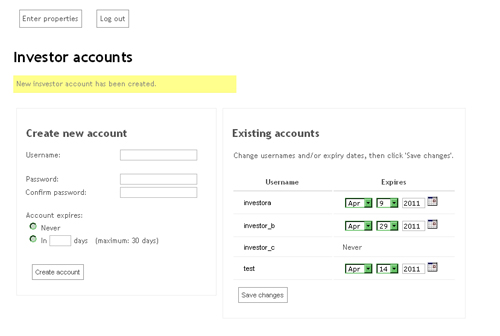CMS
What is a content management system (CMS)?
There are two ways new content or new pages can be added to your website:
- you have us add new content by editting the code directly, or
- you have us build a CMS into your website, and then you can do many things on your own.
A part of your website that provides website authoring and administration tools to users with little knowledge of design and development is a Web CMS. Simply put, if your website has a CMS, you have a password-protected admin area which enables you to publish text, images, video and other content whenever needed. It can be custom-built for your specific needs, or it can be one of well-known systems like Wordpress, Joomla, Drupal or ExpressionEngine.
Here's a view of an admin area we had built custom for one of our clients so they could manage investor accounts on their website:

Do you need a CMS for your website?
When first designing a website, or redesigning a website which had been neglected for a long while, many of our clients are not sure if they need a CMS. It sounds like a good idea to have one - after all, it does give you (or one of your people) ability to change many elements of your website without ever learning to design or code, right? Absolutely. If independence is a primary factor - yes, you need a CMS.
If you're still unsure, consider the costs. Building and maintaining a CMS can be costly compared to a website without it. While it's good to have the option of being able to do things on your own, it may or may not be worth that much to you. Without a CMS, you may need to hire someone each time you need something done on your website. For websites we built, small changes we're happy to do free of charge (say, changing a line of text or replacing an image), but if the changes are frequent, numerous, or large, you'll need to cover the costs. So if you're not expecting many changes and if you are comfortable having them done within a day or two of sending us the request, paying for a CMS makes little sense. Unlike a CMS though, we do go on vacations and charge for our workhours. If you think there'll be many content updates, you could potentially save by making them yourself.
It's been our experience that many of our clients decide to go with a CMS, and once it's all built and ready, instead of using it, they send us requests to add or change content because they're simply too busy to fiddle with it themselves. This unfortunately means that they are paying twice for the same feature: once they are paying us to build the CMS, and then they pay us again to use it for them. If you want to spend your time running your business and leave all website work to someone else, we advise not having a CMS-powered website. Custom designed and built pages do give you more freedom with layout and interactive features; they are faster to load and easier to change. And, if down the line you do realise you need a CMS - you can always add on then.
Please note - unless agreed differently, if we build you a CMS, you are responsible for loading content into your website. We usually publish enough content to get you started and to test the website, but work beyond that is not included in prices we quote.
Ok, so, let's say you need a CMS. But which kind?
There are many content management systems out there; most of the requests we get are either for a custom-built one, or Wordpress.
Wordpress
is one of the most popular publishing platforms today. Originally intended only as a blogging tool,
it is often used for publishing any sort of web content.
Its popular features include:
- ability to switch between different themes (which allow for a relatively easy change of the look and functionality of the website), and
- plugin architecture (which allows for quick and usually painless extensions to existing functions and features of the website).
If you want a Wordpress-powered website, we can install it for you, use one of thousands of free or paid-for themes (looks),
or develop an original one for your website only; we can install some of many plug-ins and widgets which enable different functionalities, from
date pickers to e-carts.
If you think you might need something simpler than that, you should consider a custom-built CMS. We've had clients who only needed to be able to moderate comments on their web pages, for example; or they wanted to manage user accounts to restrict which sections of their website were visible to which categories of users. For something like this, a custom-built CMS is better as it is less costly, more safe, requires less maintenance, and runs much faster than a full publishing platform.
We also occasionaly do larger CMS systems if existing publishing platforms can't be extended to cover all our client's needs.
Finally, if you still have any questions, feel free to talk to us about it. As deciding these things depends on many factors and can determine how much you can do with your website down the line (assuming a certain budget), it's a good idea to think things through. We'll be happy to provide any information you think could help you make the right decision.
